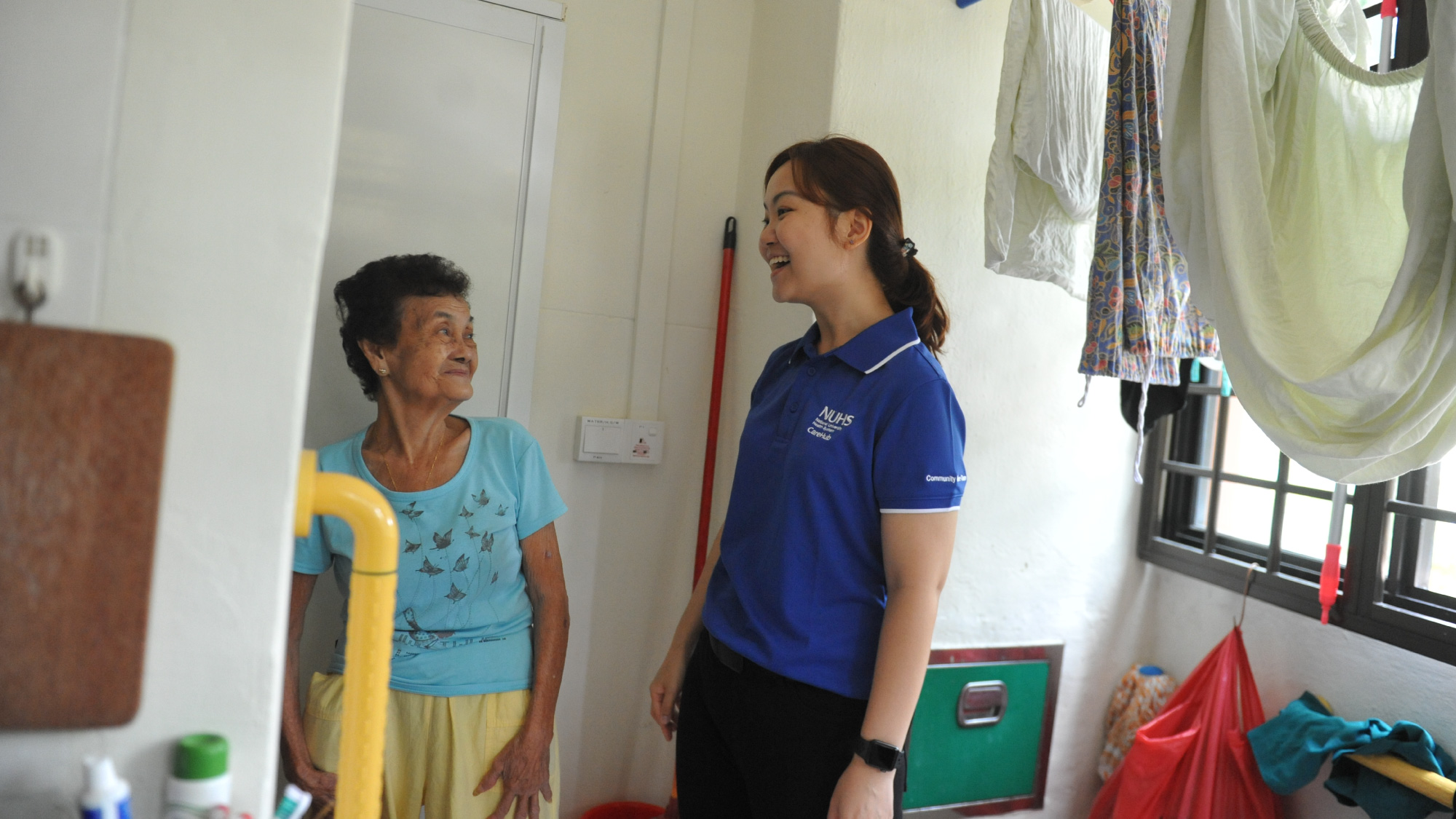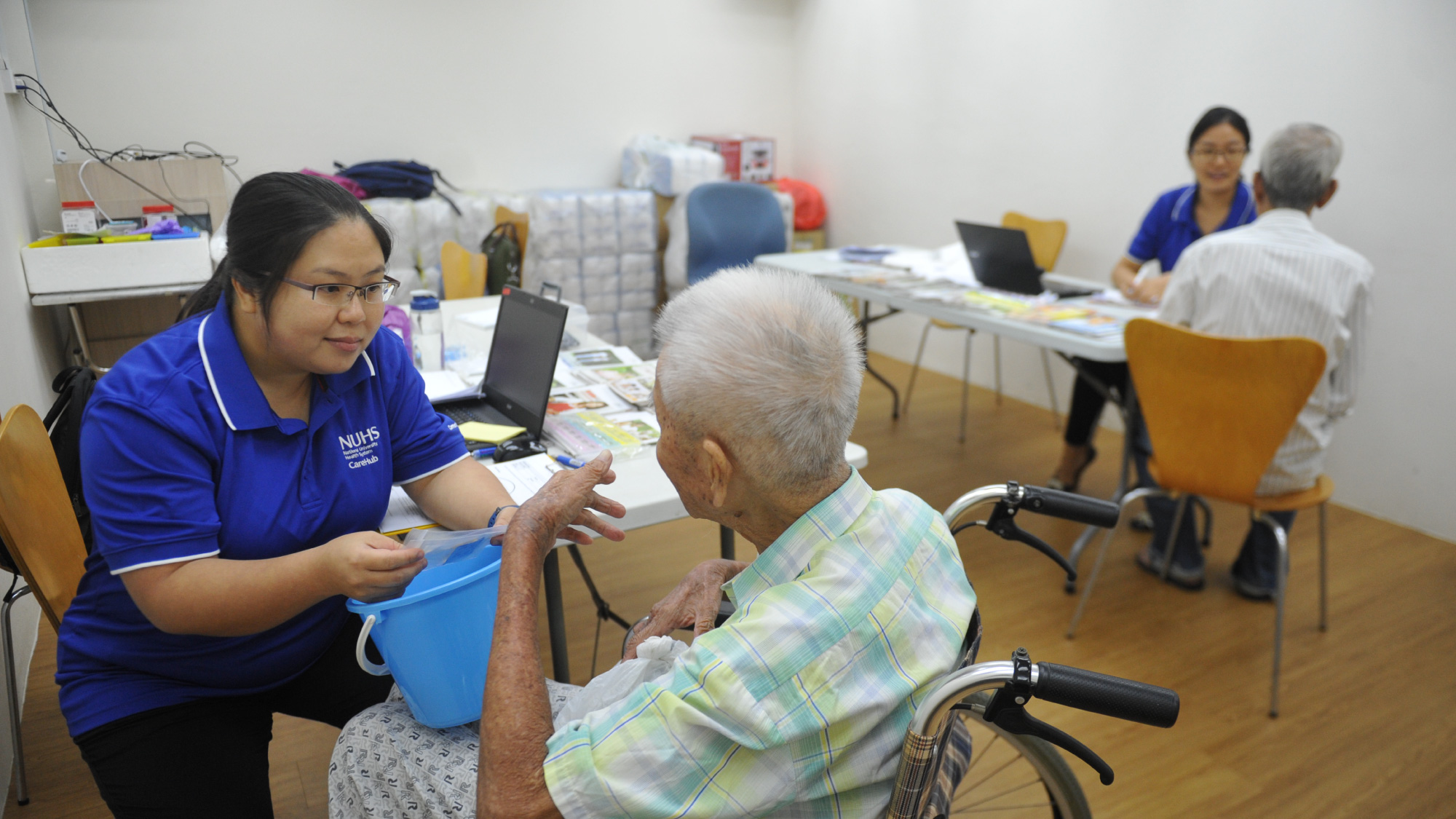The Nurse Next Door
Hoping to be more closely involved in improving the health of people, SSN Koh Shu Hua, from the NUS Nursing Class of 2012, made the switch from general ward nurse to become a community nurse after five years at NUH. She shares about what a community nurse does.
How is the job of a community nurse different from that of a ward nurse?
A community nurse provides healthcare services within the community or neighbourhood. Other than the different daily external environment, we also have vastly different job scopes as community nurses, and must go beyond looking at medical care to also consider social factors.
A ward nurse follows a fixed schedule that includes serving medication, making rounds with the team to check on patients, and educating patients and families. As the hospitalised cases are usually severe and complex, we deal with medical emergencies as a team; most of the time there will be someone around if the patient takes a turn for the worse.
Out in the community and in homes, however, there are no routines, and anything can happen. We plan our time around patients who need our care the most. This includes assessing their health, providing the care plan, and educating them. In the home, there are no ECG machines, x-rays, nor scans. When the patient’s health status deteriorates, we exercise independent clinical judgement based on experience, to assess if their condition warrants urgent medical attention. Beyond providing quality care, we also need to look into non-medical factors such as family dynamics and financial status, and link these patients up with the appropriate services or support to ensure care can continue.
I guess you could say that in the community, we are the one-stop health knowledge resource persons for residents, the ‘nurse-next-door’, and are there to support them regardless of their health status.
What is a typical day at work for you like?
I am involved in several targeted services to keep people healthy in the community, through early detection and management.
I start my day by first following up on messages and phone calls from patients to answer questions about their health status, and schedule home visits if required. I split the remainder of my time between visiting homes of patients, as well as providing counselling and other nursing services in the community.
Patients discharged from the hospital with complex care needs are followed up on at home, and I visit these patients to identify factors that could affect care at home, as well as provide training to their caregivers.

Ms Koh intertacting with a resident during a home visit.
I also work closely with community partners such as Community Network for Seniors, who refer elderly who are at risk of developing frailty. This is part of the nationwide effort to provide care for the increasingly aged population at home. During the home visit, I identify ways to overcome their barriers in attending health screenings or appointments, and provide suggestions on how the elderly’s safety at home can be improved.
For the healthy population, nursing services are provided through a Community Health Post, set up in a Senior Activity Centre or Residents’ Committee premises manned by community nurses like me. Residents can drop by to obtain health advice, counselling and monitoring of vitals.
GPs on the NUHS Primary Care Network also refer patients with chronic diseases like hypertension, hyperlipidaemia and diabetes to our team for counselling on disease and medication education, and lifestyle modifications. I then work with the GP and patient on a care plan, and set care goals to help patients care for themselves better.
What has made an impact on you (as a healthcare provider and a person?
Community nursing exposed me to a very different patient population than what I was used to seeing. The clients in the community can be on any part of the health spectrum, from those who are healthy-looking and active, to the frail and elderly who have suffered multiple falls at home, or those who have disastrous vitals as a result of not following-up on their chronic diseases.
One client who left an impression was referred to me by a befriender, who noticed that she had looked progressively weaker over the course of a few weeks. The client had been visually impaired for 30 years and relied on her grandson to take her outdoors. Since starting school however, he had less time, and so she stopped going for her doctor’s appointments and had not left her home since. Through the home visit, we noticed that she had sustained burns while cooking for herself, and would also sometimes injure herself while putting out her laundry. Despite our suggestions and cajoling to have a doctor visit, or obtain visually-impaired support, she rejected all

Nurses stationed at the Senior Activity Centre attending to residents.
interventions. Her main goal in life, she shared, was to wait for her grandson, her only pillar of support, to enter national service.
Her case made me realise that the perception of health is different for everyone, and our interventions depended very much on her own priorities in life. I came to accept that we have to respect her decisions, until she is ready for our intervention. We continue to check on her from time to time to ensure she is supported within the community.
What motivates you in your journey as a community nurse?
In the ward I saw many patients with heart and chronic diseases which could potentially have been avoided had they been more aware and made lifestyle changes early. While I could help educate warded patients and guide them back to health, I could not do as much for their family members and children, whom I felt would benefit even more from education and preventive measures. This would stop them from going down the same path of the patients. Hence I found my calling in community nursing, to help people get and stay healthy.
I am motivated when the client is motivated to make changes. I celebrate small wins together with the client, for example when the client reports increased steps on the step tracker, or achieves better controlled blood pressure.
Through being stationed at our Community Health Post, I have met clients who came to us to learn how to better manage their own chronic diseases and health. Some residents drop by with their neighbours to understand more about diet or clarify medications. I find it heart-warming to be closely involved in empowering individuals and the community to better manage their own health. Nothing rewards me more than celebrating their successes towards better health together, knowing that my journey was also their journey, and we walked it together.
Where do you see yourself in future?
I hope to gain more skills and health knowledge, as there is so much to learn about managing the health of a community. In becoming a better nurse, I hope to contribute to healthier communities.
A word of advice for anyone looking to be a community nurse?
Passion, compassion, patience, and the will to learn. These count as some of the most important requirements. As community nurses, we may not always see the results of our work immediately, but keep an open mind and be adaptable.
Training is available to guide community nurses in their provision of care, including health coaching, motivation and engagement techniques, other than the clinical aspects of the job.
Community nursing is dynamic as our job depends on responding to the needs on the ground, which differs for each client based on their needs, health and social situation. A lot of the time, we need to be resourceful in finding ways to help people achieve better health, within their home environment and community.
With the shift from healthcare to health, community care is definitely the future.
The NUHS community nurses are part of the integrated health and care delivery system working towards a healthy and engaged population in western Singapore.
